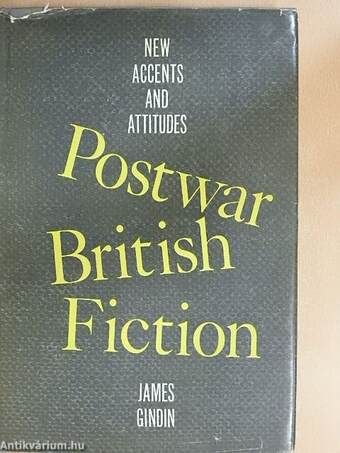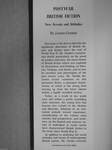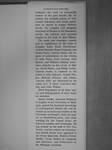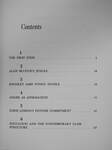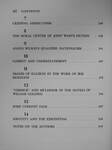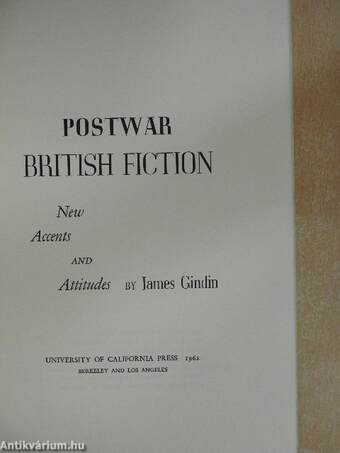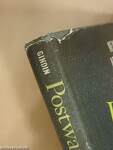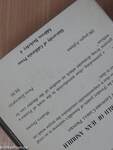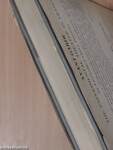1.067.327
kiadvánnyal nyújtjuk Magyarország legnagyobb antikvár könyv-kínálatát

VISSZA
A TETEJÉRE
JAVASLATOKÉszre-
vételek
Postwar British Fiction
New Accents and Attitudes
| Kiadó: | University of California Press |
|---|---|
| Kiadás helye: | Berkeley |
| Kiadás éve: | |
| Kötés típusa: | Vászon |
| Oldalszám: | 246 oldal |
| Sorozatcím: | |
| Kötetszám: | |
| Nyelv: | Angol |
| Méret: | 24 cm x 16 cm |
| ISBN: | |
naponta értesítjük a beérkező friss
kiadványokról
naponta értesítjük a beérkező friss
kiadványokról
Fülszöveg
POSTWAR BRITISH FICTION
New Accents and Attitudes By James Gindin
This book is the first to describe the significant directions of British fiction and drama since the end of World War II. Mr. Gindin's examination dwells particularly on the novel of conduct and class, the social theme of British fiction which was explored by Richardson and Fielding; by Dickens, Trollope, and Hardy; and no less by novelists and playwrights of the past twenty years. Mr. Gindin discusses recent variations on this perennial theme, a principal characteristic of which is the young hero moving up from the lower classes within a rigidly stratified society.
Today, as a result of two world wars and within a partly crumbling class structure, the young hero has become less certain of his identity and direction. Adoption of an existential attitude toward experience, consideration of the various class stresses and perspectives, and insistence on the limited and concrete nature of individual or social truths... Tovább
Fülszöveg
POSTWAR BRITISH FICTION
New Accents and Attitudes By James Gindin
This book is the first to describe the significant directions of British fiction and drama since the end of World War II. Mr. Gindin's examination dwells particularly on the novel of conduct and class, the social theme of British fiction which was explored by Richardson and Fielding; by Dickens, Trollope, and Hardy; and no less by novelists and playwrights of the past twenty years. Mr. Gindin discusses recent variations on this perennial theme, a principal characteristic of which is the young hero moving up from the lower classes within a rigidly stratified society.
Today, as a result of two world wars and within a partly crumbling class structure, the young hero has become less certain of his identity and direction. Adoption of an existential attitude toward experience, consideration of the various class stresses and perspectives, and insistence on the limited and concrete nature of individual or social truths have characterized British fiction in the years since World War II.
In addition to analyzing the social attitudes and issues of contemporary British society, Mr. Gindin critically
(continued, on back flap)
(continued from front flap) evaluates the work of noteworthy writers of the past decade. He examines the multiple points of view toward individual and social experience as shown in Angus Wilson's novels; the complex and imagistic treatment of illusion in Iris Murdoch's novels; the political and personal jungles in the work of Alan Sillitoe.
The study also examines comedy and its significance in the work of Kingsley Amis, Keith Waterhouse, Andrew Sinclair, Roger Longrigg, and Honor Tracy; various forms and degrees of commitment in the writing of John Wain, Doris Lessing, John Bowen, and William Golding; lower-class attitudes in the novels of Sillitoe, David Storey, and Philip Larkin. Current drama is explored in the works of John Osborne, Arnold Wes-ker, Shelagh Delaney, and others; "current fads" are illustrated in the works of C. P. Snow, Lawrence Dur-rell, and Colin Wilson.
Brief biographies of all these writers and bibliographies of their works are included.
James Gindin, Assistant Professor of English at the University of Michigan, gained his firsthand knowledge of contemporary British life and literature as an exchange student at the University of Glasgow, from his studies at Stratford-on-Avon, and while working for the United States Air Force in London and Cambridge. He has worked on the staff of The New Yorker; and his articles on contemporary British fiction have appeared in the Texas Quarterly, Modern Fiction Studies, Texas Studies in Language and Literature, and Publications of the Michigan Academy.
Vissza
Témakörök
- Idegennyelv > Idegennyelvű könyvek > Angol > Irodalomtörténet
- Irodalomtörténet > Világirodalom > Európai irodalom > Angol
- Irodalomtörténet > Irodalomtudomány > Tanulmány, tanulmánykötet
- Irodalomtörténet > Irodalomtudomány > Korszakok > 20. századi
- Irodalomtörténet > Irodalomelmélet > Irodalomkritika
- Irodalomtörténet > Műelemzés > Egyéb



